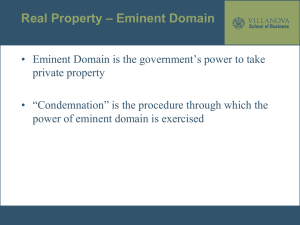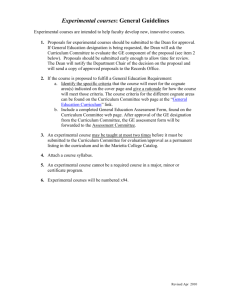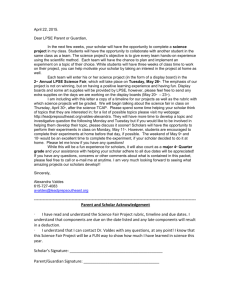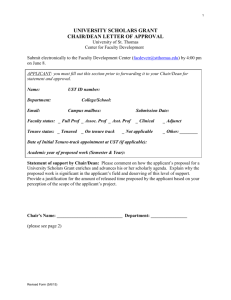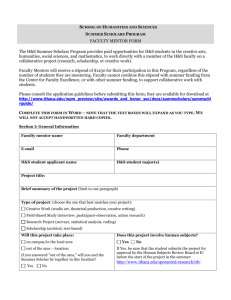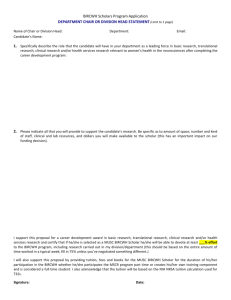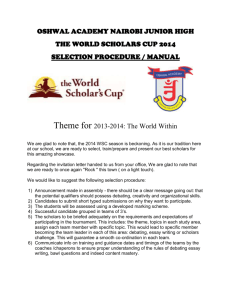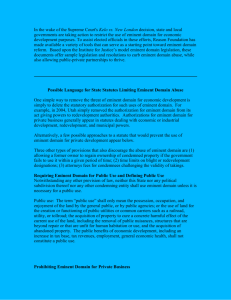Eminent Scholars - Old Dominion University
advertisement
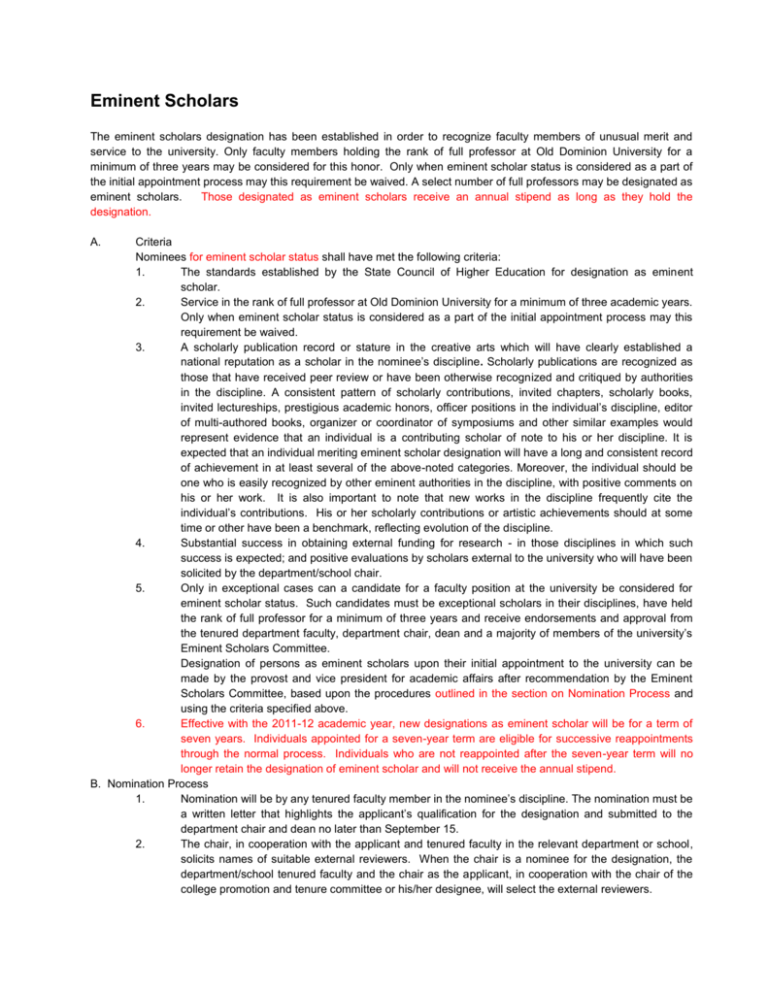
Eminent Scholars The eminent scholars designation has been established in order to recognize faculty members of unusual merit and service to the university. Only faculty members holding the rank of full professor at Old Dominion University for a minimum of three years may be considered for this honor. Only when eminent scholar status is considered as a part of the initial appointment process may this requirement be waived. A select number of full professors may be designated as eminent scholars. Those designated as eminent scholars receive an annual stipend as long as they hold the designation. A. Criteria Nominees for eminent scholar status shall have met the following criteria: 1. The standards established by the State Council of Higher Education for designation as eminent scholar. 2. Service in the rank of full professor at Old Dominion University for a minimum of three academic years. Only when eminent scholar status is considered as a part of the initial appointment process may this requirement be waived. 3. A scholarly publication record or stature in the creative arts which will have clearly established a national reputation as a scholar in the nominee’s discipline. Scholarly publications are recognized as those that have received peer review or have been otherwise recognized and critiqued by authorities in the discipline. A consistent pattern of scholarly contributions, invited chapters, scholarly books, invited lectureships, prestigious academic honors, officer positions in the individual’s discipline, editor of multi-authored books, organizer or coordinator of symposiums and other similar examples would represent evidence that an individual is a contributing scholar of note to his or her discipline. It is expected that an individual meriting eminent scholar designation will have a long and consistent record of achievement in at least several of the above-noted categories. Moreover, the individual should be one who is easily recognized by other eminent authorities in the discipline, with positive comments on his or her work. It is also important to note that new works in the discipline frequently cite the individual’s contributions. His or her scholarly contributions or artistic achievements should at some time or other have been a benchmark, reflecting evolution of the discipline. 4. Substantial success in obtaining external funding for research - in those disciplines in which such success is expected; and positive evaluations by scholars external to the university who will have been solicited by the department/school chair. 5. Only in exceptional cases can a candidate for a faculty position at the university be considered for eminent scholar status. Such candidates must be exceptional scholars in their disciplines, have held the rank of full professor for a minimum of three years and receive endorsements and approval from the tenured department faculty, department chair, dean and a majority of members of the university’s Eminent Scholars Committee. Designation of persons as eminent scholars upon their initial appointment to the university can be made by the provost and vice president for academic affairs after recommendation by the Eminent Scholars Committee, based upon the procedures outlined in the section on Nomination Process and using the criteria specified above. 6. Effective with the 2011-12 academic year, new designations as eminent scholar will be for a term of seven years. Individuals appointed for a seven-year term are eligible for successive reappointments through the normal process. Individuals who are not reappointed after the seven-year term will no longer retain the designation of eminent scholar and will not receive the annual stipend. B. Nomination Process 1. Nomination will be by any tenured faculty member in the nominee’s discipline. The nomination must be a written letter that highlights the applicant’s qualification for the designation and submitted to the department chair and dean no later than September 15. 2. The chair, in cooperation with the applicant and tenured faculty in the relevant department or school, solicits names of suitable external reviewers. When the chair is a nominee for the designation, the department/school tenured faculty and the chair as the applicant, in cooperation with the chair of the college promotion and tenure committee or his/her designee, will select the external reviewers. External reviewers are expected to be distinguished experts in the applicant’s field or disciplines with national/international accomplishments and reputations. A minimum of five such letters shall be sought and submitted along with the review letters. Care should be taken to select reviewers who can form independent evaluations and judgments. Reviewers should meet the same criteria for eligibility as Eminent Scholar Committee members as specified in section A.C.2. Further, external review letters shall remain confidential. b. The chair convenes the department/school committee composed of all department/school tenured faculty by October 1 and ensures that complete application packets are available for their review to be completed by November 15. In departments where fewer than three members are tenured, the dean, in consultation with the chair, will appoint enough additional tenured faculty members to form a committee of at least three. c. If the department/school chair is a nominee, the convening of the department/school committee and the secret balloting will be conducted by the chair of the college promotion and tenure committee or his/her designee. 3. The department/school committee shall conduct a secret ballot on the nomination no later than November 15. The department/school review letter shall specifically address the following: evidence of the candidate’s sustained focused scholarly publication record or stature in the creative arts that substantiates a national reputation as a scholar in the discipline, the substance of the external reviews, and the quality of the external reviewers. a. The chair shall complete an independent evaluation and submit it, the department/school review letter and vote, and the credentials to the dean by December 1. When the department or school chair is the nominee, the evaluation shall be conducted by the chair of the college promotion and tenure committee or his/her designee. b. The dean of the college shall evaluate the credentials and submit an independent evaluation and the faculty member’s credentials and review letters to the committee via the Provost’s Office by January 15. c. The provost and vice president for academic affairs ensures all application packets are complete and shall make these available electronically to the committee, and notify the committee when these are available for their review by February 1. The committee may, by an affirmative vote of at least five members, recommend designation to the provost and vice president for academic affairs. d. The Eminent Scholars Committee shall complete its review by March 1 and submit its recommendations to the provost and vice president for academic affairs. e. The provost and vice president for academic affairs will make the final designation no later than April 15.1 If eminent scholars announce their retirement after the process has begun, these vacancies will remain unfilled until the next year’s cycle. Preparation of Application Packets 1. Candidates are responsible for providing sufficient materials to enable the department colleagues and chair, the dean, and the Eminent Scholars Committee to decide whether they meet the criteria. In addition to an up-to-date curriculum vitae, a letter from the candidate should explain why he or she merits this honor and what is being provided to document the request for designation as eminent scholar. Five external reviews by nationally-recognized experts testifying to the national and international reputation of the body of the candidate’s work should be solicited independently by the department chair. The candidate is encouraged to solicit additional letters of this kind. A curriculum vitae from each expert should be included. Candidates should provide copies of works (refereed articles, monographs, books, etc.) regarded as representative of their most important contributions over time. Citations, reviews, and information such as awards, invited lectures, and organized symposia or conferences should also be included as evidence of a broad recognition of the importance of the works. Quality of publications--judged by eminent presses and journals, letters, etc.-outweighs quantity in the judging process. No updates may be added after the department/school review is submitted. 2. Nomination materials should be organized into proper categories, e.g., books, book chapters, peer reviewed journal articles, etc., and properly referenced in the applicant’s supporting documents. National/international scholarly and/or creative works must be in a clearly identified and separate a. C. D. category on the vitae and other supporting materials. Each applicant’s nomination material will be stored on DVD or password-protected drive that will allow committee members 24/7 access for review. The Committee 1. The Eminent Scholars Committee shall be comprised of one eminent scholar from each college, selected by the college promotion and tenure committee, plus one eminent scholar chosen by the Faculty Senate in order to reflect the affirmative action goals of the university. If a college has only one eminent scholar who is ineligible to serve due to a conflict of interest, then the dean and full professors of that college can select a representative from among the eminent scholars from any college. The eminent scholar selected must not have been selected to represent his or her college and have no known conflict of interest that would impair or call into question his or her impartiality in evaluating the nominees. It is recommended that each eminent scholar will serve on the committee for one three-year term. No dean, associate dean, assistant dean or department chair shall attend, be a member or participate in the deliberations of the Eminent Scholars Committee. The committee will select its own chair, and deliberations shall remain confidential. 2. Before an eminent scholar participates in committee reviews, he or she must be evaluated by the dean for actual or potential conflict of interest with any applicant based on the following: Is a close relative (e.g., spouse, minor child, sibling, or parent) or partner; Is a close professional associate or other colleague and/or has a financial interest in the outcome of the applicant’s review; Acts as an officer, director, member, owner, trustee, expert, advisor, consultant (with or without compensation), or employee of the applicant or other organization that would be affected by his or her decision; Negotiating or has an arrangement for prospective employment with an applicant or other organization that would be affected by his or her decision; and Conducting research or other professional activities with an applicant or has done so within three years of the review date. 3. The Committee will be convened by the provost and vice president for academic affairs by November 1. At that time, the provost and vice president for academic affairs will brief the committee about its responsibilities and duties. The committee will elect its own chair and set its agenda. -Approved by the president December 12, 2003 Revised May 28, 2009 Revised December 17, 2010 _________________________ 1 See the Schedules for Faculty Personnel Actions in the appendix for specific dates and actions.

